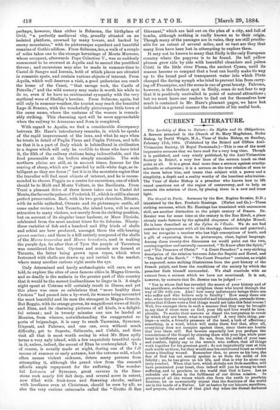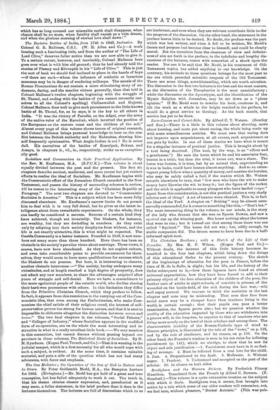The Gospel in Paris. Sermons by the Rev. Eugene Bersier,
D.D. ; translated by the Rev. Frederic Hastings. (Nisbet and Co.)—These striking sermons, whioh Mr. Hastings has translated with uncommon skill, are another distinction to the pulpit oratory of France. Dr. Bersier was for some time at the oratory in the Rue Rivoli, a place already made famous by the splendid eloquence of Adolphe Mcleod. He is here described as of the Eglise de l'Etoile. We do not find ourselves in agreement with all his theology, theoretic and practical; bat we recognise a teacher who has high conceptions of truth, and a gift of expressing them in picturesque, clear, logical language. Among these twenty-five discourses we would point out the two, coming together and naturally connected, "To Know after the Spirit," and "The Presence of Christ." "A Court Preacher," a very striking description of the relation between John the Baptist and Herod, and "The Salt of the Earth." "The Court Preacher" contains, as might be expected, some striking illustrations from the past history of the French pulpit, and from the conditions of the society by which the preacher finds himself surrounded. We shall conclude with an extract from a sermon which we have not mentioned. It is not, however, by extracts that Dr. Bersier can be judged You to whom God has revealed the secret of your history and of his providence, endeavour to enlighten those who travel through the way of life with you. Alas ! how many unfortunate beings there are who suffer and who believe only in fatality ! How many there are who, when they see iniquity successful and triumphant, persuade them- selves that if there were a God things would not take this fatal course Well, live amongst them in such a manner that they may be brought to say that if there were no God, your life and love would be inex- plicable. To soothe their sorrows or dispel the temptation to revolt by which they are beset, what is required P A very little thing, per- haps—a smile, a friendly pressure of the hand, a look of affection ; something, in a word, which will make them feel that, after all, everything does not conspire against them, since there are hearts that love them still. But beware especially lest you profane the consolations of the Gospel by uttering them with your lips, while your heart is indifferent and cold. Do not, from the midst of your ease and comfort, lightly say to the wretch who suffers, that all things work together for his greatest good ; do not imprudently cast at him such words as these, for they would sear his embittered heart as vitriol burns a bleeding wound. Remember that, to prove us his love, the Son of God has not merely spoken to us from the midst of his felicity ; no, he has given us his life, and that is why he alone can truly comfort. When that love, which shrinks not from sacrifice, will have penetrated your heart, then indeed will you be strong to meet suffering, and to proclaim to the world that God is Love. Let us redouble our efforts in the fulfilment of our divine mission. In presence of all the voices which rise from the earth to proclaim fatalism, let us unweariedly repeat that the destinies of the world are in the hands of a Father. Let us hasten by our labours, sacrifices, and prayers, the advent of that glad day when the dismal darkness
which has so long covered our miserable earth shall disappear, when chance shall be no more, when fatality shall vanish as a vain dream, and when the glorious morning of eternal love shall dawn ! "



































 Previous page
Previous page